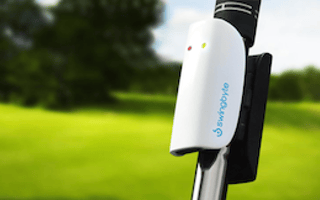
Golfers are notoriously fond of gadgets, from technologically advanced clubs to niche tools for getting out of tight situations, all in the hope that tech will help improve their game. But Swingbyte is a gadget focused on helping golfers improve their skill, not just their game.
Swingbyte straps onto a golfer’s club, measuring each swing and showing golfers the data on their latest round. Users can see where their swings are going wrong, work with golf coaches on fixing those mistakes and track their improvement over time to see how a better swing can help boost scores.
A promising idea, but Swingbyte isn’t alone in helping golfers track their swings.
“There wasn't anything really like this on the market before we introduced it in 2012, but today there is a lot more competition,” said product and marketing general manager Patrick Cerone. “And golf [marketing] can be a challenge. A lot of the marketing is done by very large brands and it can be very expensive to get in front of the consumers that you want to get in front of.”
So instead of trying to out-market solutions from big-name brands, the company is turning to emerging tech to beat competitors. With the beta Swingbyte Virtual Golf Coach, for instance, the company is bringing actual insights to the data its collecting.
“The hardware is important,” Cerone said. “It's the mechanism that captures that swing data, but anyone could make the hardware. That's not the real magic. The magic is in the algorithm and what you do with the data once you capture it.”
The new system works by comparing swing data against a database of mistakes, then offering targeted advice to reduce errors in future swings. The system was trained by professional golf instructors, who were able spot mistakes in existing swing data, and uses machine learning to spot mistakes in future strokes.
[video:https://youtu.be/Il0c91puTJg width:600 autoplay:0]
Cerone thinks that in the future, hardware is going to become even less important, getting embedded into clubs, clothing and more. But handling that data will be what consumers are really looking for.
“Soon after Swingbyte was launched, our users were coming to us saying, 'All this data is cool, but what does it mean?'” Cerone said.
The story behind the data isn’t just interesting to golfers; any wearable produces more data that users know what to do with. That, Cerone said, is why Swingbyte hopes to expand from golf to other tracked activities as its machine learning algorithm improves and evolves. The same AI used to help golfers spot swing errors could help runners improve workouts, swimmers perfect their form and everyday people get fit more intelligently.
As the company continues down that path, Cerone said he and his team are looking to hire a chief technolgy officer with machine learning interests to help build out the error-spotting system.
Image via Swingbyte
Does your startup have a story to share? Drop us a line or tweet us @BuiltInChicago



